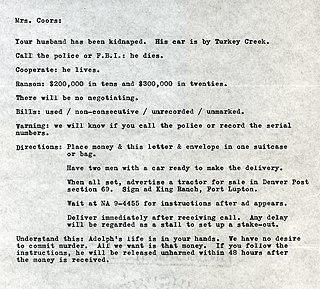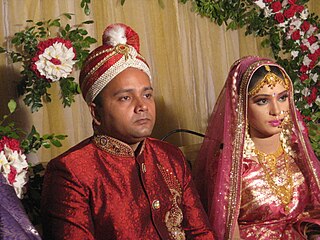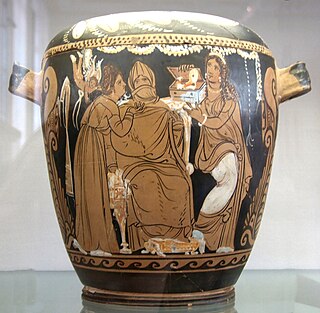Related Research Articles
A dowry is a payment, such as property or money, paid by the bride's family to the groom or his family at the time of marriage. Dowry contrasts with the related concepts of bride price and dower. While bride price or bride service is a payment by the groom, or his family, to the bride, or her family, dowry is the wealth transferred from the bride, or her family, to the groom, or his family. Similarly, dower is the property settled on the bride herself, by the groom at the time of marriage, and which remains under her ownership and control.
Blood Wedding is a tragedy by Spanish dramatist Federico García Lorca. It was written in 1932 and first performed at Teatro Beatriz in Madrid in March 1933, then later that year in Buenos Aires, Argentina. Theatre critics often group Blood Wedding with Garcia Lorca's Yerma and The House of Bernarda Alba as the "rural trilogy". Garcia Lorca's planned "trilogy of the Spanish earth" remained unfinished at the time of his death, as he did not include The House of Bernarda Alba in this group of works.

In Islam, nikah is a contract between two people. Both the groom and the bride are to consent to the marriage of their own free wills. A formal, binding contract – verbal or on paper – is considered integral to a religiously valid Islamic marriage, and outlines the rights and responsibilities of the groom and bride. Divorce in Islam can take a variety of forms, some executed by a husband personally and some executed by a religious court on behalf of a plaintiff wife who is successful in her legal divorce petition for valid cause.
Bride burning is a form of domestic violence practiced in countries located on or around the Indian subcontinent. A category of dowry death, bride-burning occurs when a young woman is murdered by her husband or his family for her family's refusal to pay additional dowry. The wife is typically doused with kerosene, gasoline, or other flammable liquid, and set alight, leading to death by fire. Kerosene is often used as the cooking fuel for dangerous small petrol stoves, so it allows the claim that the crime was an accident. It is most common in India and has been a major problem there since at least 1993.

Runaway Bride is a 1999 American screwball romantic comedy film directed by Garry Marshall and starring Julia Roberts and Richard Gere. The screenplay, written by Sara Parriott and Josann McGibbon, is about a reporter (Gere) that is assigned to write a story about a woman (Roberts) who has left a string of fiancés at the altar.

Bride kidnapping, also known as marriage by abduction or marriage by capture, is a practice in which a man abducts the woman he wishes to marry.
Ali Kazimi D.Litt. is an Indo-Canadian filmmaker, media artist and writer.
Dowry deaths are deaths of married women who are murdered or driven to suicide over disputes about dowry. Dowry deaths are found predominantly in India, Pakistan, Bangladesh, and Iran.

Hindu marriage harmonizes two individuals for ultimate eternity, so that they can pursue dharma (responsibility/duties), arth(money), and kama(conjugal love). It is a union of two individuals as spouses, and is recognized by liveable continuity. In Hinduism, marriage is not followed by traditional rituals for consummation. In fact, marriage is considered complete or valid even without consummation because the marriage is between two souls and it is beyond the body. It also joins two families together. Favorable colours are normally red and gold for this occasion.
My Left Breast is a Canadian documentary film, directed by Gerry Rogers and released in 2000. Starring Rogers and her partner Peg Norman, the film documents Rogers' experience being diagnosed with and treated for breast cancer.

The men's rights movement in India is composed of various independent men's rights organisations in India. Proponents of the movement support the introduction of gender-neutral legislation and repeal of laws that they consider are biased against men.
Weddings in the United States and Canada follow traditions often based on religion, culture, and social norms. Most wedding traditions in the United States and Canada were assimilated from other, generally European, countries. Marriages in the U.S. and Canada are typically arranged by the participants and ceremonies may either be religious or civil. There is a tradition that the prospective bridegroom ask his future father-in-law for his blessing.

Muslim marriage and Islamic wedding customs are traditions and practices that relate to wedding ceremonies and marriage rituals prevailing within the Muslim world. Although Islamic marriage customs and relations vary depending on country of origin and government regulations, both Muslim men and women from around the world are guided by Islamic laws and practices specified in the Quran.
Groom kidnapping, colloquially known as Pakaruah shaadi or Jabaria shaadi, is a phenomenon in the western parts of Bihar and eastern Uttar Pradesh states, more prominent in Munger and Dumka wherein eligible bachelors are abducted by the bride's family and later forcibly married, to get men with better education and/or richer men. Considering the traditional regard for the marriage sacrament, most such marriages are not annulled. Additionally, the groom may suffer fake criminal charges under Indian dowry law, and end up fighting lengthy legal battles.

Domestic violence in India includes any form of violence suffered by a person from a biological relative but typically is the violence suffered by a woman by male members of her family or relatives. Although Men also suffer Domestic violence, the law under IPC 498A specifically protects only women. Specifically only a woman can file a case of domestic violence. According to a National Family and Health Survey in 2005, total lifetime prevalence of domestic violence was 33.5% and 8.5% for sexual violence among women aged 15–49. A 2014 study in The Lancet reports that although the reported sexual violence rate in India is among the lowest in the world, the large population of India means that the violence affects 27.5 million women over their lifetimes. However, an opinion survey among experts carried out by the Thomson Reuters Foundation ranked India as the most dangerous country in the world for women.

The Nisha Sharma dowry case was an anti-dowry lawsuit in India that represented how IPC 498A law can be misused. It began in 2003 when Nisha Sharma accused her prospective groom, Munish Dalal, of demanding dowry. The case got much coverage from Indian and international media. Nisha was portrayed as a youth icon and a role model for other women. The case ended in 2012, after the court acquitted all accused. The court found that Nisha had fabricated the dowry charges to wriggle out of the wedding.

The dowry system in India refers to the durable goods, cash, and real or movable property that the bride's family gives to the groom, his parents and his relatives as a condition of the marriage. Dowry is essentially in the nature of a payment in cash or some kind of gifts given to the groom’s family along with the bride and includes cash, jewellery, electrical appliances, furniture, bedding, crockery, utensils, vehicles and other household items that help the newlyweds set up their home. Dowry is referred to dahez in Hindi and as jahez in Urdu.

Bride price, bride-dowry, bride-wealth, or bride token, is money, property, or other form of wealth paid by a groom or his family to the woman or the family of the woman he will be married to or is just about to marry. Bride dowry is equivalent to dowry paid to the groom in some cultures, or used by the bride to help establish the new household, and dower, which is property settled on the bride herself by the groom at the time of marriage. Some cultures may practice both simultaneously. Many cultures practiced bride dowry prior to existing records.
Wedding customs in Ethiopia vary among the diverse tribes of the country, and are among the most important expressions of each tribe's culture.

Marriage in ancient Greece had less of a basis in personal relationships and more in social responsibility. The goal and focus of all marriages was intended to be reproduction, making marriage an issue of public interest. Marriages were usually arranged by the parents; on occasion professional matchmakers were used. Each city was politically independent and each had its own laws concerning marriage. For the marriage to be legal, the woman's father or guardian gave permission to a suitable man who could afford to marry. Orphaned daughters were usually married to uncles or cousins. Wintertime marriages were popular due to the significance of that time to Hera, the goddess of marriage. The couple participated in a ceremony which included rituals such as veil removal, but it was the couple living together that made the marriage legal. Marriage was understood to be the official transition from childhood into adulthood for women.
References
- ↑ "Abandoned brides subject of TV show". New Glasgow Evening News, April 14, 2005.
- ↑ "Nasty tales of arranged marriages gone bad; Passionate Eye's Runaway Grooms; Canadian men marry women in India, take the dowry, then divorce and ditch bride". Montreal Gazette , April 20, 2005.
- ↑ "Runaway husbands: Abandonment a disturbing trend". The Province , April 20, 2005.
- ↑ "The Gemini winners". The Globe and Mail , November 20, 2005.